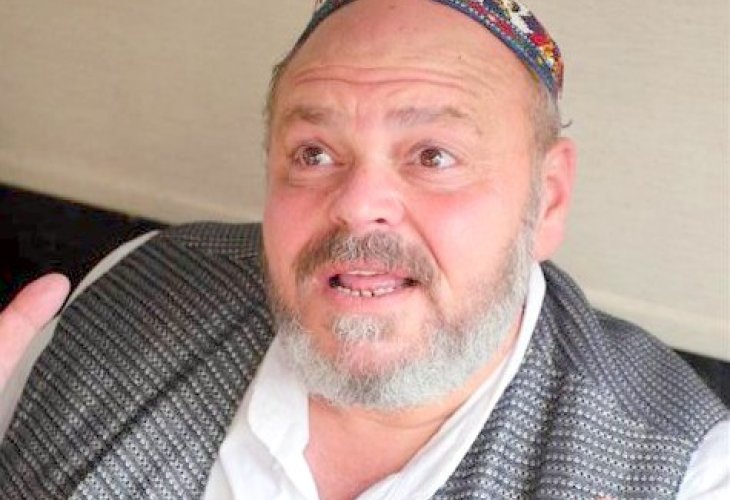Personal Stories
A Storyteller’s Return: Yosef Sela’s Journey to Torah
From secular fame to faith, Yosef Sela shares how storytelling and Hasidic wisdom brought him closer to Torah and a meaningful Jewish life
- |Updated

Yosef Sela, known to many as “Yosef the Storyteller,” may sound familiar from children’s programs like “Garden Party” on Channel 1, or “Yosef Tells About Pillows” on Channel 2, or perhaps from the storytelling festivals aired late at night. But not everyone knows about the remarkable personal journey he’s gone through in recent years, which actually began at a storytelling festival in Austria.
Yosef was born and raised in northern Tel Aviv in a home with no real connection to Judaism. He spent time at his Hungarian grandmother’s house, where he heard many stories. He credits his love of storytelling to his parents’ home, especially his father, who used to take him to bookstores and let him pick out any books he wanted. “I would sit on a rocking chair on the porch all summer,” Yosef recalls. “I could finish four books in a day.”
Being a storyteller is a unique career. How did it begin?
“I went on a seven-year journey through Europe, South America, the Caribbean, and other places. When I came back to Israel, I partnered with a friend to open a gutter factory. One night, an elderly Brazilian neighbor knocked on my door at midnight. She told me about a storytelling workshop opening in Tel Aviv. When I got there, registration was already closed, but I asked them to hear the story I had prepared. They agreed. After I finished, they told me they were accepting me because of the sparkle in my eyes. That’s how the workshop started with me and forty kindergarten teachers.”
It quickly became clear to Yosef that storytelling was his true calling. At first, he performed for free, but within two years he was already performing at international festivals. His big break came with the “Garden Party” program on Channel 1. The producers were looking for a storyteller to close each episode with a short story, and it just so happened that the casting director had once hired Yosef to perform in her preschool. “When I walked into the audition, I saw the biggest names in Israeli theater,” Yosef says. “I never imagined myself on television. I was embarrassed and just wanted it to be over. The next day they called to say I was chosen. I thought they’d lost their minds! But they told me: ‘Everyone else was acting, but you were real.’”
Ironically, just when Yosef had reached the peak of his career, his own show on Channel 2, financial success, and a name as the top storyteller in Israel, he began to feel an emptiness. “It wasn’t a regular kind of emptiness,” he says. “It was an emptiness that comes when something real is missing. I had everything, but it wasn’t enough. At a festival in Austria, I told a story in German. The audience stood and applauded for ten minutes. Later, at a luxurious hotel in the mountains, I felt like I was on top of the world but I suddenly started crying. I realized I hadn’t created all this on my own. That’s when I first recognized Hashem. I said to myself, ‘This can’t all be random.’”
Later, a Scottish man asked him, “Why don’t you, a Jewish storyteller, share stories of the Baal Shem Tov?” Yosef was embarrassed, he had no answer. “When I returned to Israel,” he says, “I bought books of Hasidic stories, and that really opened the door to Judaism for me. A few years later, I started keeping mitzvot when I joined a community in Tel Aviv. My wife was very supportive. My parents didn’t object since they were never religious to begin with. I mainly connected with the Lithuanian (non-Hasidic) community here in Elad, but I’m also very drawn to Hasidut.”
What’s the secret to telling a story that really moves people?
“First, the story has to touch you. When you’re telling a story from your own life, that usually happens naturally. It has to come from the heart, simply and honestly. You need to be relaxed, not trying too hard and just be yourself, not who you think people want you to be. People crave truth, and that’s all they really accept. Even when I was afraid, I showed it. That honesty is what makes you trustworthy.”
You also had a show on the Hidabroot channel called “Stories of Nations.” What was that like?
“It was amazing to meet other creative people, and that’s what we did on the show. I wanted to show that when someone becomes religious, they don’t disappear. On the contrary, they rise higher. After the program, I released an album called ‘Essential Song’ with some of the guests. I’m now working on a second album, and I hope it will be ready soon.”

